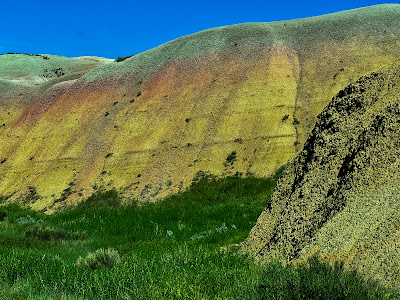The park protects 242,756 acres of sharply eroded buttes and pinnacles, along with the largest undisturbed mixed grass prairie in the United States. For 11,000 years, Native Americans have used this area for their hunting grounds. Archaeological records combined with oral traditions indicate that these people camped in secluded valleys where fresh water and game were available year-round.
What a great view to wake up to
The land erodes at the rate of 1 inch per year
Ben Reifel Visitor Center has dioramas depicting the past biomes in the park
A summer afternoon 40 million years ago
A large Brontotheres on the right.
Hesperocyon a direct ancestor to today's dog families
Hyaenodon is an extinct carnivorous mammal
Archaotherium was a large piglike animal
that hunted small animals and also ate plant matter
Depiction of Archaotherium
Mesohippus is an extinct genus of early horse.
It lived 37 to 32 million years ago in the Early Oligocene
In the fossil prep lab you can watch them carve
the matrix that hides the fossil bone
You can watch a magnification of this process on a large screen TV
A Broontotheres skull.
They are ancestors to todays horses, rhinoceroses, and tapirs.
They could measure 8 feet tall and 16 feet long
Erosion reveals the colorful hills
Some very shy Pronghorn Antelope
There was herd of more than a 100 bison
There many very large Prairie dogs colonies
Later at the Stage Creek campground,
7 bison wandered through.





















Hello, I have followed your site for a while and want to thank you for taking us along. Your posts are always informative and cool. Keep up the good work.
ReplyDelete